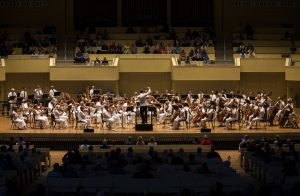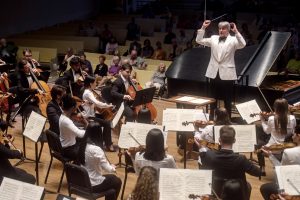
STAFF WRITERS : JUSTIN KELLY & FLORA JUNHUA DENG
This week, there will be many opportunities to engage in discussion and analysis of Russian history. But there will only be one opportunity to live through it, according to Rossen Milanov, the music director of Chautauqua Symphony Orchestra.
That opportunity will occur at 8:15 p.m. Wednesday, July 18, in the Amphitheater, where the CSO and the Music School Festival Orchestra will join forces to present Dmitri Shostakovich’s Symphony No. 7 in C Major, op. 60, “Leningrad,” under Milanov’s baton.
Shostakovich’s Symphony No. 7 is considered by many, including Milanov, to be one of the most important symbols of the Russian struggles in World War II. Explicitly, the piece depicts the Nazi assault on Russia that culminated in the nearly 900-day siege of Leningrad, one of the most destructive war events in human history.

However, many experts including renowned conductor Mark Wigglesworth, have said the real narrative behind the seventh symphony is Joseph Stalin’s destruction and repression of Russia and its culture.
Shostakovich could not publicly express such thoughts under Stalin’s regime, but he could hide them in his music.
“(You can) view it as a piece that conforms to the ideology of the ruling party at the time or a piece that reflects on the terror during the Stalin years,” Milanov said. “I think it’s a little bit of both because like all the music he wrote, at least until the death of Stalin, it was very ambiguous on purpose.”
According to Timothy Muffitt, music director of the MSFO, the ambiguity in Shostakovich’s composition was because of the conflict between the threat Shostakovich was under and his own will in representing the Soviet people.
“We are not sure which side of the story is being told because Shostakovich had to walk a certain Soviet party line to avoid imprisonment and execution,” Muffitt said. “But at the same time, he was able to be true to himself, and true to his comrades, and his fellow countrymen, which is of course the source of his great appeal — that the people of the Soviet Union knew that he was their musical voice. And he was able to, for the most part, create a body of music that said what … needed to be said and still survived the experience.”
Milanov said the ambiguity built into the score affects his interpretation of the symphony.
“I never really take a big triumphant moment without looking for something that makes that victory darker,” he said. “Someone is always going to spoil the parade.”
That “somebody” could be Hitler, Stalin, or the ominous storm clouds of evil. Whatever the answer, Milanov is bringing awareness of the tensions and stories in the score — however ambiguous — to the young musicians in the MSFO.
“It’s kind of nice for me to give them the context of what those notes actually could mean and how we could create something that really tells a story,” Milanov said. “This particular piece is a perfect example, I think, because it does have a very strong narrative that could be interpreted on so many different layers depending on your point of view.”
Milanov has a wealth of experience working with aspiring musicians. He began his career as music director of the Chicago Youth Symphony Orchestra and led the training orchestra, Symphony in C, for 15 years.
“I absolutely love it,” Milanov said. “Even if (the MSFO musicians are) not 100 percent sure that this is what they want to do with their lives, they are building a musical knowledge and culture that will stay with them for the rest of their lives.
Muffitt said tonight’s concert will be an invaluable opportunity for the music students. The orchestra required for Symphony No. 7 is larger than the complement of either the CSO or the MSFO individually, so a joint concert allows them to do something they wouldn’t be able to do otherwise.
“Either orchestra could play this piece (by) hiring the extra musicians to pull it off, but lining up with the theme of the week, and then putting these two institutions together, creates a remarkable feeling of an event,” Muffitt said. “And it’s on a Wednesday night. It’s not on a traditional MSFO night, it’s not on a traditional CSO night. It stands by itself as a special event.”




